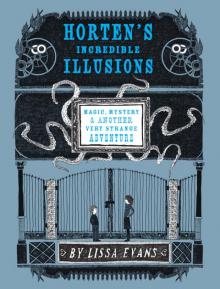- Home
- Lissa Evans
Spencer's List Page 5
Spencer's List Read online
Page 5
She was still pondering the blank page when there was a tapping on the kitchen window and she looked up to see the wavering tip of a long bamboo pole. At the other end, on the other side of the garden wall, was Fran.
‘I tried waving but you were concentrating so hard you didn’t see me,’ she said, when Iris had opened the back door. ‘What were you doing?’
‘Oh just, um… a shopping list.’ The concept of writing New Year’s Resolutions in September was too complicated to explain.
‘I wanted to give you these.’ Fran handed two envelopes over the wall, and a bottle of Australian champagne. ‘It is today, isn’t it, that they’re legal?’
‘That’s right. Thanks, Fran, they’ll love that.’
‘Are they up yet? Or is that a stupid question?’
‘They were at a party last night.’ They’d returned at about 3 a.m. and let themselves in with the exaggerated quietness of the truly drunk. Iris had woken when one of them dropped his keys in the hall, and had stayed awake long enough to hear them giggling hysterically in the kitchen as they tried to make toast with crispbread (now fused all over the inside of the toaster).
‘So it’s a stupid question then,’ said Fran. ‘Say happy birthday from me and tell them mine’s a vodka next time we’re in a pub together.’
‘Would you like a cup of tea?’
‘Can’t. We’re supposed to be fixing this bloody guttering.’
‘Fran?’ Peter’s sonorous voice called from the shed next door.
‘Coming.’ She rolled her eyes. ‘God, it would be nice to spend just one weekend not propping the house up. See you.’
Back in the kitchen, Iris picked up her pen again and added a full stop after the number 1. Four years ago, the first time she had written the resolutions, it had been on an impulse and she had rattled out the first ideas that came into her head. Her mother had died just the month before and the boys’ birthday had been the first remotely pleasant event for a very, very long time. It had seemed a hopeful new starting point, a potential hinge on which she could begin to turn her life and, even in retrospect, the items had not seemed overly ambitious. The next year, when it had become clear how much support her father would need, she had toned them down a little; the year after that, gripped with frustration, she had come up with twenty-eight suggestions (including ‘tell boys to stop growing’ – a response to a terrifying bill for school uniforms) and then ripped out the page and started again. The year after that had been too demoralizing to even think about. This year, she had decided, there were to be no repeats. This year every resolution was to be new and all of them achievable.
1. Do all the housework myself
This was not (she told herself) the supine gesture it appeared, but a positive step. She had tried cleaning rotas, and they had always failed. Neither of the boys appeared to see any point in keeping the flat tidy. Their vast shoes lay like reeking tank traps across the hall, tripping anyone who came in. They experienced no revulsion at the sight of toenail clippings scattered across the living-room rugs and the smell of damp towels screwed up into a bundle and left under the bed for two weeks seemed scarcely to register. They were happy to drink tea out of cups encrusted with coffee grounds and when Tom dropped half a packet of sugar onto the kitchen floor, he’d considered that kicking the spilled grains under the washing machine was an adequate response; three weeks later Iris was still peeling her shoes off the lino every time she used the kettle. There was no malice involved; they just didn’t think.
Of course, they liked wearing clean crease-free clothes, but never evinced curiosity as to how these things appeared in the cupboard. Iris had stopped ironing once, but had resumed after five days when the enormous pile of washing actually prevented her from getting to the sink. Neither twin had apparently noticed this, but then the sink was merely the place where you fished around in cold scummy water to find the can-opener. She knew that to an outside eye – Fran’s for instance – her inability to enforce any kind of regular tasks seemed feeble. But what Fran – in her determined way – had never really grasped was how tiring it was to try and be the boss all the time. Begging, nagging, baffled tears – none of these things were worth it. The boys would very slightly alter their behavioural patterns for a couple of days (say, trying to aim for the bin when cutting their toenails in the living room) before reverting to exactly the same irritating habits that had prompted her outburst in the first place. Iris would be exhausted, and nothing would have changed.
How much easier, then, to do it all herself. Instead of determining that Robin and Tom would or should have household responsibilities, she was going to work from the baseline that nothing got done unless she did it. She would no longer be living a lie and, as far as she could see, her workload would be exactly the same. It would be freedom of mind rather than body, but would mean that any action by the twins – anything at all, from the merest lifting of a pair of pants into the linen basket, to the rinsing of a jam knife before it was used for marmite – would be a bonus. It would be a victory born of defeat, and she wished she had thought of it years before.
2. Dress appropriately
This resolution had been prompted by an incident at work, some weeks ago. It had been raining heavily, and she’d been shaking off her old blue anorak prior to hanging it on a peg. The part-time receptionist, Ayesha, had glanced at it in passing as she carried an armful of notes into the filing room. ‘Nice coat,’ she’d said, as the door closed. Iris had actually looked round, assuming that Ayesha must have been speaking to someone else. ‘Nice coat’? From someone who had a pierced nose? She’d looked at the anorak anew. It was dark blue and had a zip and a quilted lining. In an identity parade, its only distinguishing features would have been a ‘Save the Children’ sticker, now bent in half and covered in fluff, and the crumbled remains of a shortbread in one of the pockets. ‘Nice coat’?
That evening, she had checked with Fran. Could Ayesha’s remark have been sarcastic?
‘No, people wear these now.’
‘Do they? You mean, not just people like me?’
‘What do you mean, “people like you”?’
‘People who’ve been wearing the same coat for seven years. Longer than that, actually, because it was my mother’s. She thought it was sensible, though – she wouldn’t have worn it for a social occasion.’
‘Well, its time has come. You are officially finger on pulse.’
Iris had pondered her trendiness. ‘Does that mean it’s been unfashionable for the whole time I’ve been wearing it?’
Fran had hesitated. ‘Not so much unfashionable as –’ She’d struggled for a description.
‘Frumpy?’
‘No. More… afashionable.’
It was a scientific distinction that Iris could appreciate, describing not so much the opposite of fashion, as the total absence of it. She’d taken a moment to absorb this. ‘Could you tell me when its time has gone again? Maybe I should know. I don’t want to become an embarrassment.’ Like Mrs Simms, she had thought suddenly, a neighbour from her childhood. Mrs Simms had taught the piano, had been to Oxford and was reputed to know Anglo-Saxon; she was famous locally, however, for dressing like Wurzel Gummidge. No item of her clothing ever seemed to have been selected with reference to any other item. An average outfit might consist of a beret, a nip-waisted ‘New Look’ jacket, a dirndl, ribbed tights and patent-leather sandals; it was as if she dressed in the dark. ‘Her mind’s on higher things,’ Iris’s mother had once explained, kindly. Sitting in the kitchen with Fran, Iris had felt a presentiment that she might turn into Mrs Simms – so unaware of fashion that she ended up creating her own.
After the conversation she had looked critically through her wardrobe – at the items of clothing chosen solely for their practicality, or the ability of their pockets to hold a paperback and a tube pass. Style simply hadn’t entered it. At eighteen she had at least had an awareness of what someone of her own age was supposed to wear, even if she never see
med quite the right shape to carry it off. Her nickname at school had been ‘Lanky’ and it was still a reasonable description. ‘You could be a real clothes horse,’ a friend had said once; it was supposed to be a compliment, but Iris had instantly imagined one of those wooden concertinas, draped with damp washing.
After the twins were born, for many years her clothes seemed to have been covered in mashed potato, and by the time they had moved on to packed lunches she had somehow lost the thread; she no longer knew what she was supposed to look like. What did thirty-seven-year-olds wear?
The boys were hopeless; they seemed to view her as a separate species, one to whom the normal rules did not apply. When prodded, they’d occasionally offer the phrase ‘you look nice’, but in much the same way as one might praise a Martian’s tentacle-protector, if a comment were demanded. What she needed was a guide, someone who could point the way through the maze, so that at least she’d be going in the same direction as everyone else. She thought, in the meantime, that she might start buying some magazines and looking at the pictures, to get her eye in, so to speak.
3. Limit
‘Oh Godddd.’ Eyes half closed, hair randomly flattened, Tom shuffled into the kitchen. ‘Have we got any aspirin?’
‘Happy birthday,’ said Iris.
‘Oh,’ he nodded very slowly. ‘Ta.’ He was dressed in Tom and Jerry boxer shorts and a huge baggy jumper, his arms wrapped around himself.
‘Paracetamol’s better for a hangover – there’s some in the bathroom.’ He shuffled out again, hunched over as if battling against a strong wind.
3. Limit Dad’s phonecalls
‘I can’t get the top off.’ Tom reappeared, pathetically holding out the paracetamol container. He sank into a chair as Iris lined up the arrows and flipped off the top, and watched pallidly as she filled a glass of water for him.
‘Thanks, Mum.’ He made a great play of swallowing the tablets, jerking his head back and retching as they went down. He had always been terrible at taking medicine, and she had dreadful memories of the time he’d had impetigo, when she had had to invent a different ploy for every single dose of antibiotic: mashing in jam, liquidizing in syrup, crushing in ice cream.
‘I think I’ll go back to bed,’ said Tom, barely moving his mouth.
‘Do you want your presents now?’
‘No. Later.’ He stood up carefully and made his way out of the kitchen, one hand on the wall to support himself.
Iris still liked to maintain a semblance of surprise when it came to giving birthday presents, so the boys would specify a narrow range of goods, among which she was allowed to freely pick her gift. Robin had requested a subscription to either Viz magazine or The Face (she had chosen the latter) while Tom had asked for a Nike t-shirt, v-necked, short-sleeved either in dark blue with a white neckline or white with a dark blue neckline. Even though it made shopping easier, she yearned for the days when there were so many things they wanted that she could scarcely decide which to get. Flying in the face of experience she still bought them one or two extras – books they would never read, key-rings for losing, videos for taping over – but the resulting pile of gifts, supplemented only by Boots’ tokens from her father and a five-pound postal order (between two) from Auntie Kath, seemed woefully little compared to the mountains of electrical goods and clothing reportedly received by their friends.
‘IgottaincarstereoanerwalkmansixpairsofCalvinKleinpants anerRolextypewatchthanksforaskinMissisUnwin,’ as Tom’s friend, the fast-talking but always impeccably polite Leon, had informed her recently.
‘How on earth does his mum afford it?’ she’d asked after he left. (‘ByeMissisUnwinthanksforhavinme.’)
‘His uncle nicks it,’ Tom had replied, laconically.
3. Limit Dad’s phonecalls to half an hour
She’d given up trying to cut down the frequency of her visits; her father was lonely, her work was only five minutes’ walk from his house and there was therefore really no excuse not to pop round for supper on Tuesdays and Thursdays and for at least a cup of tea on Fridays, though the latter was not an absolutely rigid appointment. Sunday lunch, on the other hand, was immutable; the roast went in the oven before her father went to church and she would arrive just in time to make the gravy, a task which she rather enjoyed. After lunch, she’d do the washing-up and her father would take ‘ten minutes’ and then he’d garden and she’d read, and then soon enough it would be Monday again. And if there were moments when she panicked at the encroachment upon her own life, when she wondered what would happen when the twins left home – whether he’d expect her to visit every night – on the whole it seemed simpler just to go along with his routine rather than live with the guilt of breaking it. The problem (the problem that she wanted to tackle this year, anyway) was the phonecalls. They were getting longer.
On Mondays she rang her father; on Saturdays – and often on Wednesdays – and sometimes even on Sunday evenings, he rang her. As they had always only just seen each other, there wasn’t an awful lot to say, and he took such a very long time to say it.
He had never been much of a conversationalist, in the dictionary sense of giving and receiving information in a relaxed and entertaining way, and on her visits they would often maintain a comfortable silence for long stretches; but of course that wasn’t possible on the phone, and his calls were more in the nature of slow monologues, which she would prod along with supplementary questions. She had recently splurged a frightening amount of money on a cordless phone and had thus found that during one of her father’s average calls she was able to empty the washing machine, hang the clothes on the line, take them in again when it started raining, cut an irritating snag off her left thumbnail and peel a panful of potatoes, all the while saying little more than ‘uh huh’ and ‘really?’
He was holding back the silence, postponing the moment when the phone would go down and he’d return to an empty house, and as a result she knew about every aspect of his life, knew which shoe polish he used and where the best pork chops could be bought. She knew his favourite weather forecaster (Michael Fish) and where he got his lawnmower repaired. Most of all she knew about Mr Hickey, the hated neighbour whose garden backed on to his own and whose fence was, according to her father, creeping inch by inch across his herbaceous border.
Robin and Tom had long since ducked out of the Sunday visit, but still dutifully talked on the phone to him once a week, calls in which her father tried to resuscitate his moribund conversational skills.
‘Hi, Grandad.
‘It’s Robin… yes I know, everyone says we sound alike.
‘Ha ha.
‘Fine.
‘Art, Media Studies and General Studies.
‘Ha ha.
‘Six foot five.
‘OK, bye then. Here’s Tom.’
‘Hi, Grandad.
‘Yup.
‘Six foot five, yup.
‘Same as last week, Geography, Spanish and Theatre Studies.
‘Don’t know yet, depends if I pass them.
‘Yup, she’s called Samantha Fox, we’ve been going out for two years.
‘You told me that one last time.
‘OK, bye then. Here’s Mum.’
Frowning at Tom, she would take the phone. ‘Hi, Dad. How’s things?’
Apart from ‘Oh yes, and what did he say?’ that would be almost her last contribution to the conversation. Towards the end of the call he would usually remember to ask her a couple of questions about work or finances, but was completely thrown if she replied with anything other than the blandest of assurances. Detail rattled him.
‘What do you mean? Processing what?’
‘Word-processing skills. It’s just a three-day course, so I can keep up with new –’
‘Dr Steiner saying you’re not skilled at the moment, or what?’
‘No, it’s just that we’re computerizing the –’
‘It’s a vocabulary thing, is it?’
‘No it’s a –’
>
‘He knows you got a place at university, doesn’t he?’
‘It’s not that, it’s –’
‘I used to learn a word a day. You should get the boys to try that. Start at A in the dictionary and work through…’
It was not – she told herself – that her father didn’t care, just that he found it hard to focus on other people’s problems. It was as if her crisis of eighteen years ago was still quite enough to be going on with thank you very much, the shockwaves still reverberating.
She looked at the resolution again, and then – feeling brutal – crossed out ‘half an hour’ and substituted ‘20 minutes’; there was no point in being half-hearted about this. She had to be ruthless in pursuit of this year’s aims – ruthless, bold, bloody and resolute as she reclaimed her life.
Though as to her method of prising him off the phone, she had no clear strategy. There was a limit to the number of overflowing milk pans or unexpected visitors she could claim, and she really didn’t feel ready (just yet) to tell him the truth.

 V for Victory
V for Victory Old Baggage
Old Baggage Wed Wabbit
Wed Wabbit Big Change for Stuart
Big Change for Stuart Spencer's List
Spencer's List Horten's Incredible Illusions
Horten's Incredible Illusions Horten's Miraculous Mechanisms
Horten's Miraculous Mechanisms Their Finest Hour and a Half
Their Finest Hour and a Half Crooked Heart
Crooked Heart